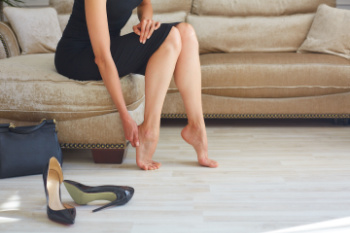
High heels are a staple in many women's wardrobes, with about 40 percent wearing them daily. However, the fashionable choice often comes with a painful price. Three quarters of women wearing high heels experience foot pain regularly. The height of the heel and the narrowness of the toe box are the main culprits. High heels often force toes into unnatural positions, that may lead to bunions, which are bumps along the inside of the big toe, and hammertoes, where toes become bent at the middle joint. Over time, these conditions can worsen, causing significant discomfort and permanent changes in foot structure. High heels also can contribute to tight calf muscles, which may result in plantar fasciitis and Achilles tendonitis. To avoid these issues, select shoes with a proper fit, ensuring that your toes have adequate space to move. For those already suffering, treatments include toe pads, separators, and in severe cases, surgery. If you are experiencing foot pain from high heels, it may be time to reconsider your footwear choices. For guidance with foot problems, it is suggested that you schedule an appointment with a podiatrist for an exam and treatment options.
High heels have a history of causing foot and ankle problems. If you have any concerns about your feet or ankles, contact Daniel Mendoza, DPM from Nashville Podiatry. Our doctor can provide the care you need to keep you pain-free and on your feet.
Effects of High Heels on the Feet
High heels are popular shoes among women because of their many styles and societal appeal. Despite this, high heels can still cause many health problems if worn too frequently.
Which Parts of My Body Will Be Affected by High Heels?
- Ankle Joints
- Achilles Tendon – May shorten and stiffen with prolonged wear
- Balls of the Feet
- Knees – Heels cause the knees to bend constantly, creating stress on them
- Back – They decrease the spine’s ability to absorb shock, which may lead to back pain. The vertebrae of the lower back may compress.
What Kinds of Foot Problems Can Develop from Wearing High Heels?
- Corns
- Calluses
- Hammertoe
- Bunions
- Morton’s Neuroma
- Plantar Fasciitis
How Can I Still Wear High Heels and Maintain Foot Health?
If you want to wear high heeled shoes, make sure that you are not wearing them every day, as this will help prevent long term physical problems. Try wearing thicker heels as opposed to stilettos to distribute weight more evenly across the feet. Always make sure you are wearing the proper shoes for the right occasion, such as sneakers for exercising. If you walk to work, try carrying your heels with you and changing into them once you arrive at work. Adding inserts to your heels can help cushion your feet and absorb shock. Full foot inserts or metatarsal pads are available.
If you have any questions please feel free to contact our office located in Hendersonville, TN . We offer the newest diagnostic and treatment technologies for all your foot and ankle needs.
